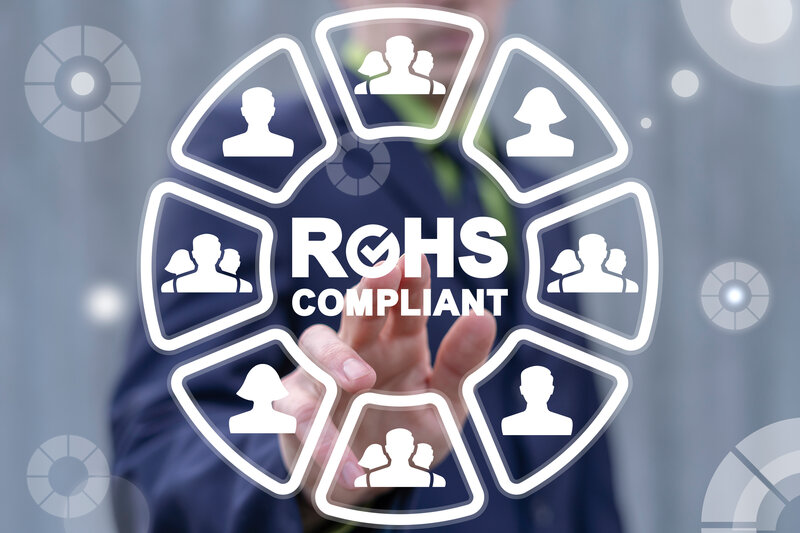
If you are in the electronics industry or manufacture electrical products, you may be aware of RoHS (Restriction of Hazardous Substances Directive), as it affects your ability to sell directly or indirectly to the European Economic Area (EEA). Likewise, Dura Magnetics is very familiar with supplying to customers that require RoHS Compliance for their magnet and assembly orders because magnet plating, materials used in assemblies, and electromagnets can all impact a part’s compliance.
What is RoHS and what substances does RoHS cover?
RoHS is a European Union (EU) regulation, officially adopted in 2006, to regulate the use of certain substances that can be hazardous to both people and the environment.
Originally, RoHS pertained to six substances. The compliance regulation was expanded in 2019, under RoHS 3, to cover 10 total substances. RoHS provides the maximum allowable levels for these 10 substances.
The substances currently included in RoHS and their maximum allowable limits are:
- Cadmium < 100 ppm
- Lead < 1000 ppm
- Mercury < 1000 ppm
- Hexavalent Chromium < 1000 ppm
- Polybrominated Biphenyls < 1000 ppm
- Polybrominated Diphenyl Ethers < 1000 ppm
- Bis(2-Ethylhexyl) phthalate < 1000 ppm
- Benzyl butyl phthalate < 1000 ppm
- Dibutyl phthalate < 1000 ppm
- Diisobutyl phthalate < 1000 ppm
Does RoHS apply you?
RoHS will apply to any entity that sells applicable products, parts, components, cables, equipment, and sub-assemblies to countries in the EEA (European Economic Area), which includes 27 EU Member States and Iceland.
Even if you do not sell directly to those countries, RoHS may still apply to your business. RoHS also applies to any business that sells to distributors or integrators that then sell the products to EEA countries.
What was the progression of RoHS?
RoHS 1 initially included six substances. The next iteration, RoHS 2, included a CE-marking directive, which stated that any CE-marked products must be RoHS compliant. The CE marking indicated a product conformed to EU regulations for goods sold in the EEA.
The list of substances covered was expanded under RoHS 3 by including four phthalates: Bis(2-Ethylhexyl) phthalate, Benzyl butyl phthalate, Dibutyl phthalate, and Diisobutyl phthalate.
How do I get an RoHS Certification?
To obtain an RoHS certificate, you will need to follow this process:
- Testing: Testing is done using x-ray florescence metal analyzers or chromatography to determine RoHS substance values in your product. Testing can be outsourced to a RoHS testing laboratory.
- Process Audit: Manufacturing processes are reviewed for opportunities of part contamination by unintended substances such as chemicals/substances used during manufacturing, chemicals/substances in the area during manufacturing, or contaminated part packaging.
- Documentation Review: A review technical documents and reports, such as certificates of compliance and safety data sheets from your suppliers is performed.
- Receipt of Certification: A successful audit will result in a RoHS Certificate of Compliance being issued to your business from the RoHS testing laboratory. This will consist of a series of lab test results to prove compliance. The company itself also receives independent laboratory chemistry data and creates its own certificate of RoHS compliance from the objective evidence.
Once you have received your certificate, you are fully RoHS 3 compliant.
Is RoHS related to WEEE?
WEEE (Waste from Electrical and Electronic Equipment) is an EU regulatory compliance similar to RoHS. WEEE covers the process related to disposal – specifically the treatment, recovery, and recycling of electric and electronic equipment, whereas RoHS relates to manufacturing. The EU mandates that all products that are applicable must also be in WEEE compliance.
Dura Magnetics is RoHS Compliant
Dura Magnetics has the capability to comply with and support the original European Union Directive as well as the later expansions as needed by our customers. View our compliance letter, and learn about our quality, compliance and handling processes.
Dura Magnetics is a leader in custom magnet engineering. We design and manufacture custom magnet solutions and magnet assemblies for our client partners. Together, we build mission-critical components to fuel innovation and pioneer technology.
Contact us today to learn more.

